Introduction
Cities worldwide are facing global challenges that require a higher implication of cities in their solution. Global warming, migration flows, or growing inequalities are global issues but might be solved or mitigated with local solutions. Some cities’ networks are already embracing this new situation, coming together to address global challenges with local initiatives, sharing knowledge and resources, trying to do their part, and reclaiming more power and responsibility. The C40 network, the Global Parliament of mayors, Eurocities… are just some examples of this new way to address global issues.
While in developed countries cities are reclaiming their position according to their needs and responsibilities, in developing countries the situation is not the same. Many of the larger cities in developing countries are facing the challenge of rapid urbanization, such as social instability, failure of infrastructure, water crises, and the spread of infectious diseases. These cities are required to address these emergencies, counting on the support of their National Governments and NGOs, but are we sure that their voices are taken into account both in the identification of the problems and in the definition and implementation of the solutions?
Considering the role of NGOs in supporting countries and territories to eradicate poverty while protecting the planet, how can we also introduce the cities and local communities as referent stakeholders? On the other hand, how can we increase the number and engagement of donors in activities of supporting countries and communities in need?
In our proposal, we aim to let resources arrive at the local entities that are able to identify issues and propose solutions while in a faster and more efficient way and at the same time increase donors’ engagement by giving them decision power and more transparency and accountability in regards to how the donations are being used.
Actors
- UNDP: a bridging organization that connects the needs identified at the local level with the opportunities of support provided by global donors. It plays a key role in offering a platform that connects different stakeholders.
- Local partners: entities that work at the local level and are aware of the real problems of their communities and therefore are the best ones in identifying possible solutions.
- Development Coalitions: association of local partners that come together to better decide on how to spend the resources that they receive, both in payment and services. These organizations count on decision power on how to use the resources that they receive.
- Supporters: any stakeholder that wants to support some development coalitions in developing some of the locally define projects.
Proposal
Phase 1: Local initiative
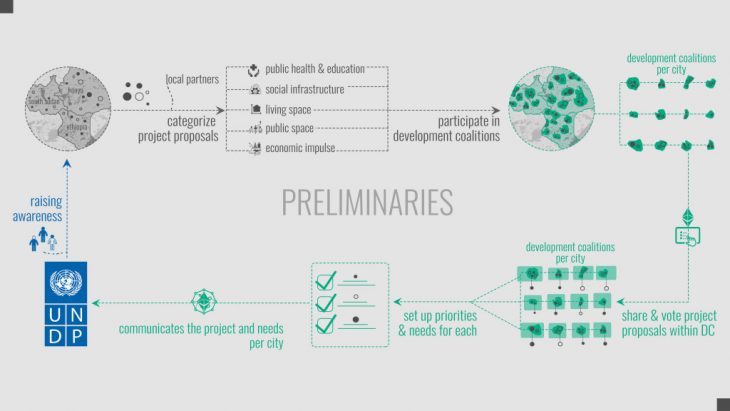
Phase 2: Global initiative
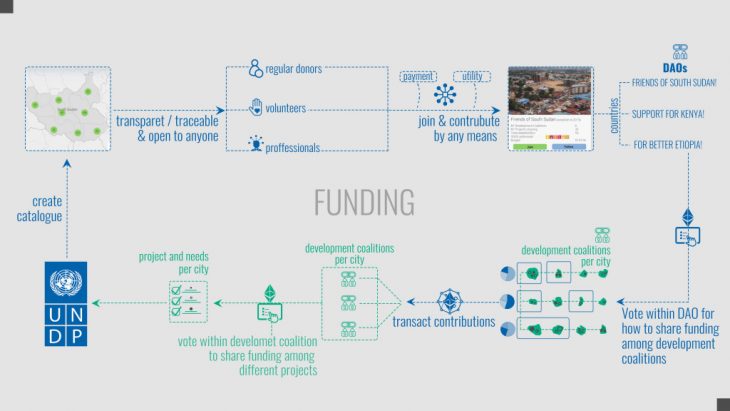
Case study
To better explain the entire proposal, we simulate the case of how this project could be implemented in South Sudan, a country founded in 2011, who suffered a civil war in 2013 that left 400,000 people killed and forced two million of the country’s population of 12 million to flee outside the country, where they still languish in refugee camps. Some 80% of those remaining in South Sudan are needing humanitarian assistance, as stated by the UN.
With the aim of supporting the local communities in overcome this difficult situation, we propose the creation of the decentralized organization “Friends of South Sudan”, a community of donors and other agents that are willing on participating in the improvement of the conditions of Sout Sudan. Each agent will be able to support some local communities in solving their needs. An example of these communities is the Development Coalition of Juba, the capital of South Sudan. By accessing the UNDP projects platform, every agent will be able to see what are the characteristics of this Development Coalition and decide what are the causes that they want to support.
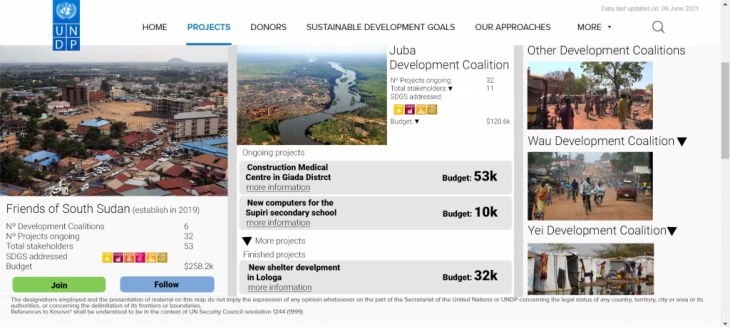
Donors information website
Once a donor decides to join the “Friends of South Sudan” community, he will be able to provide support in two ways:
- Financial support: sending money (in terms of payment tokens)
- Services: Any kind of support it can be done remotely, either using zoom or any other service.
The donor will also have the power to decide which “needs” wants to support among the different priorities raised by each local community suing the “support tokens” to vote. In the simulation, after checking the needs of different development coalitions, the donor will decide to support the needs of Wau, mainly for the emergency situation of its refugee camp.
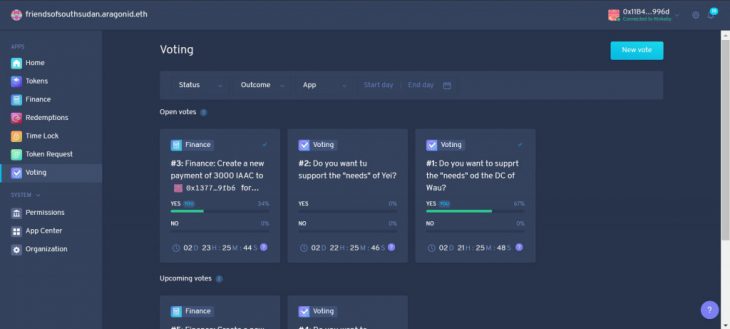
Friends of South Sudan voting options
Beyond the vote, the community decided to support Juba Development Corporation, sending both funding and services in terms of training hours. These resources are being sent to the safe of Juba Development Corporation, which will hold a vote to confirm that the need is still a priority. Once all the local members have confirmed, the safe will be used to release the needed resources.
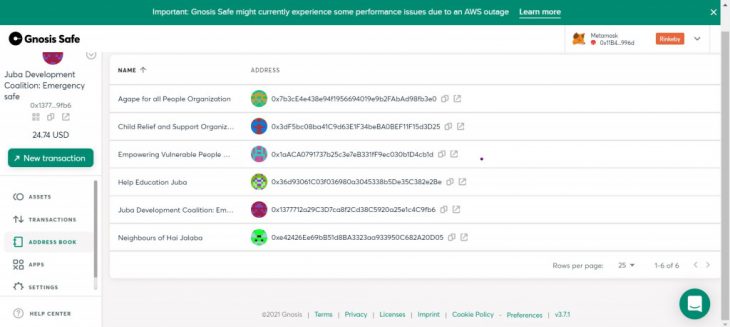
Members of Juba Development Coalition
Conclusion
This entire process allows to empower local communities and increase the engagement of donors by creating a more direct channel between needs identification and support sent. It aims to be complementary to current systems, giving more power to cities in comparison to the National Government, following the principle of subsidiarity.
Development Coalitions for cities in need is a project of IAAC, Institute for Advanced Architecture of Catalonia developed at Master in City & Technology in 2020/21 by students: Sinay Coskun & Riccardo Palazzolo Henkes and faculty: Maria-Luisa Marsal Llacuna